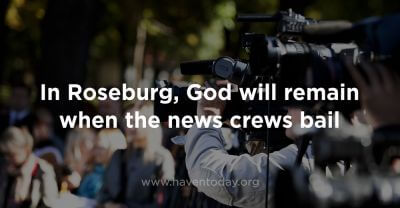This post was originally featured on USA Today.
I know. After 19 firefighters died in Prescott, Ariz., the spotlight flared out as we rebuilt our lives.
TV news vans with telescoping satellite antennas have converged on the town of Roseburg, Ore. They huddle in parking lots surrounding Umpqua Community College, where a shooter stole the lives of nine students and teachers. For the next few days, reporters will document local folks recounting the horror, crying, remembering, and even staring like deer into the headlight of national news coverage.
Then, one day, the antennas will zip back down into the roofs of the vans. And as fast as they came, the reporters will be gone. The pain, however, will not go with them. And the little town will be left with a gaping void — not only from the absence of the national news but also from the deafening absence of irretrievable life.
I know this because two years ago I was the townspeople. The town had a different name — Prescott, Ariz. But we had a similar rural demographic and a similar story of tragic death — the loss of 19 firefighters overtaken by a wildfire. How odd it felt when the last news truck left.
What becomes of these communities, after they have left the national spotlight? Their grieving process stunted by bright lights and once-in-a-lifetime attention, how do these towns resume life or discover their new normal, once the TV vans leave?
The answer to how people get along for the months and years following a national tragedy lies deeper than the generic community. The answer lies in the individual people — the woven threads and strands who make up the weave that we call community.
Seven years ago, I left a journalism career to become a Christian minister. I moved from documenting the funeral procession to leading it, from observer of grief to participant among the grievers. In this role, I have learned that there is no easy answer to give to a heartbroken mother or a mourning husband. There is no single sentence that can soothe the sting of death, injustice, lost life and suffering.
And yet, I have seen — time and again — that there are paragraphs and ideas that do soothe the sting of death for many. Some thoughts — gripped by the soul and held as belief — do give stability, peace and hope in the midst of unthinkable, horrific pain.
Nationally, we are lamenting that this same senseless shooting keeps recurring across this country. It seems that only the names of the locations, victims and killers change from month to month, week to week.
And yet, I have seen — behind the scenes and long after the TV news vans leave — another recurring narrative. A more positive recurring story of hope, humanity, unity and rebuilding.
This positive narrative remains consistent in the empty wake, the churning months and years that follow a national tragedy. I have witnessed it, as a reporter, in the parents of drowned children, in the husband whose wife died, in the activist who fought for immigrants dehydrating in the Arizona desert.
I’ve seen this positive recurring story. In the moments of crisis when humans should most likely curse God and turn from any belief in a creator, many humans embrace their God and renew their spiritual beliefs.
More than ritual or obligation, I have seen souls anchor themselves.
Survivors from Umpqua Community College report that the shooter systematically targeted Christians for immediate murder. We don’t yet know why people of Christian faith were singled out for murder.
But the families of these murdered Christians, if they are anything like the believers I have met in the wake of other tragedies, will support each other, make meals for the hurting and knit tighter into their faith. They will mourn, but “not as those who have no hope.”
The surviving families of Christian victims will find solace in their belief that God transports all who cry out to Him into a place where there is no pain or injustice.
People far from a tragedy ask questions like: Where is God in the pain and suffering?
But I rarely hear that question in the huddle of crying of widows, sobbing dads and embracing friends. The people most broken down discover these Scriptures to be true.
“The Lord is near to the brokenhearted” and “The Lord upholds all who are broken down” (Psalm 34:18, Psalm 145:14).
Survivors of the tragedies I have reported on and ministered through have this in common. Many whose lives are most held together and stable credit a divine helper who hears their cries for help. Who answers. And who never leaves town.
Experiencing God in the Wake of Tragedy

